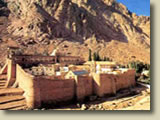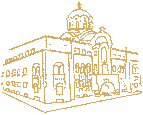| Information
Service of
the Serbian Orthodox Church
February
7, 2005

ARCHBISHOP
DAMIAN OF SINAI RECEIVES BISHOP JOANIKIJE
On
February 5 His Beatitude Archbishop Damian of Sinai received His
Grace Bishop Joanikije of Budimlje and Niksic and a delegation
of clergy and faithful from the Diocese of Budimlje and Niksic
who are currently on a pilgrimage to the Holy Land.
Tomorrow
Bishop Joanikije and the pilgrims will be visiting Mt. Horeb (the
Peak of Moses), where Holy Liturgy will be served in the small
Orthodox chapel there. The peak of Horeb is at an elevation of
2,642 meters above sea level; consequently, Bishop Joanikije and
the pilgrims will be trekking on foot for four hours.

BISHOP
JOANIKIJE SERVES IN THE SINAI
 On
the day of the commemoration of the Holy Apostle Timothy and the
Martyr Anastasios, His Grace Bishop Joanikije of Budimlje and
Niksic served Divine Liturgy in the Sinai in the St. Catherine’s
Monastery. All pilgrims took part in the Holy Mysteries of Christ. On
the day of the commemoration of the Holy Apostle Timothy and the
Martyr Anastasios, His Grace Bishop Joanikije of Budimlje and
Niksic served Divine Liturgy in the Sinai in the St. Catherine’s
Monastery. All pilgrims took part in the Holy Mysteries of Christ.
At
the foot of one of the highest peaks of the Sinai, Jebel Musa
(the Mountain of Moses), the Emperor Justinian built the great,
fortified monastery of St. Catherine in the 6th century. The monastery
includes a great church dedicated to the Transfiguration of Our
Lord but also several other churches, one of them dedicated to
the Dormition of the Most Holy Theotokos. The altar of this church
is located in the place where God appeared to Moses in the form
of a flaming bush, a bush that burned and yet was not consumed,
telling him: "I am the God of your father, the God of Abraham,
the God of Isaac, and the God of Jacob. Put off your shoes from
your feet, for the place on which you are standing is holy ground."
(Exd 3:5-6) In this altar the clergy serves without shoes. Upon
coming to the Sinai this was the first church venerated by St.
Sava. It is the exact location where Moses was grazing his flock
when he heard the voice of God from the burning bush ordering
him to lead the suffering people of Israel from Egypt to their
ancient homeland.
The
greatest teacher of the local monks was St. John of the Ladder,
the abbot of the monastery of Mt. Sinai, a saint and great ascetic
with an exceptionally large following of monks. Bishop Joanikije
and a group of pilgrims from the Diocese of Budimlje and Niksic
prayed to God here this morning for our much-suffering and much-sinning
people.

NEW
ISSUE OF BULLETIN “CRUCIFIXION OF THE SERBIAN LANGUAGE” PROMOTED
IN NIKSIC
In
Niksic on February 5 the Action Group of Professors and Instructors
of Serbian Language and Literature promoted the new issue of their
bulletin “Crucifixion of the Serbian Language” which is prepared
by professors who have been fired from their jobs in Niksic secondary
schools.
The
new, second issue of the bulletin dedicated to the Assembly held
in December of last year in Niksic, represents a university-level
response to the current problems of Montenegrin society: language,
identity, culture and the being of the Serbian language, gathering
primarily texts of participants in the Assembly itself but also
including texts by other intellectuals who expressed their thoughts
and views regarding these very important issues, said fire professor
Radinko Krulanovic in his introductory remarks, adding that this
magazine represents a warning to the current Montenegrin regime
to stop creating further divisions among the people.
"Crucifixion
of the Serbian Language” represents a testimonial about ourselves
and the Serbian language to which we belong, a true and original
language whose letters originate from the Scripture, emphasized
Assistant Professor Dr. Jelica Stojanovic, adding that every letter
symbolizes bears the concept of God, the concept of man, life,
perspective, mind, heaven and earth, light, and these letters
are also cradle and hearth of the Serbian language from time immemorial
to tomorrow. That is why the Serbian language is being crucified
and that is why, despite the false tongues and persecutors, we
must testify, said Jelica Stojanovic.
In
the opinion of Ljiljana Vujadinovic at the Assembly, to whom the
new issue of “Crucifixion” is dedicated, the issue of language
has been proven and justified by scientists. Nevertheless, the
Declaration on the defense of the name of the Serbian languages
adopted then, which is still being signed, demands that we invest
maximum efforts so that the spirit of the Declaration will reach
every citizen of Montenegro.
The
president of the Action Group of Professors and Instructors of
Serbian Language and Literature, Veselin Matovic, once again emphasized
the importance of the Assembly which, in his view, was a search
for an answer to the violence being carried out by the Montenegrin
regime in trying to impose and permanently plant one politics
and one ideology among the people of Montenegro through culture
and education. These claims are borne out by the fact that there
is not one cultural institution that is not under the direct control
of the government while in the schools they are introducing their
ideology through new school programs such as the catalog of knowledge
for the so-called “mother tongue,” concluded Matovic.
Other
speakers at the promotion included fired professors Svetozar Cirakovic
and Miodrag Todorovic. Among other things, they read an open letter
to the school council of the Stojan Cerovic Secondary School,
and a letter of support sent to the professors by a group of intellectuals
who are former students of the former general secondary school
in Niksic.
S.C./S.K.

SLAVENKO
TERZIC: MOVEMENT FOR PRESERVATION OF STATE UNION WILL ASK OSCE,
COE AND THE UN TO MAKE IT POSSIBLE FOR ALL CITIZENS OF MONTENEGRO
TO VOTE IN POSSIBLE REFERENDUM
At
the founding assembly of the Movement for the European Union of
Serbia and Montenegro organized by citizens of Montenegro living
in Serbia and held on February 5, 2005 in Belgrade’s Syndicate
Hall, Professor Dr. Slavenko Terzic presented the main and the
only goal of this Assembly:
"First
of all, we will address all appropriate institutions in Montenegro
with the clear request that all citizens of Montenegro must be
given the opportunity to participate in the referendum in the
event that it is held. We have no objections to the referendum
being held, if that is what is agreed upon by the Constitutional
Charter and the Belgrade agreement; however, with the participation
of all citizens of Montenegro, not just those living in Serbia,
but all those who have Montenegrin citizenship.”
If
the Montenegrin state leadership is not receptive to this request,
Terzic said that the next addresses it will be sent to will be
OSCE and the Council of Europe.
"We
will address OSCE in Vienna and the Council of Europe in a civilized
manner with a clear proposal supported by international conventions
and supported by the experiences of other states, e.g. the United
States and Croatia. You have seen all of west Herzegovina voting
in the elections for the president of the Republic of Croatia,
and no one can be denied the right to vote on issues such a referendum
on state constitutional status.”
Terzic
also announced the formation of legal teams comprised not only
of domestic but also international legal experts.
"We
have been in touch with a considerable number of people throughout
the world, professors of international law, who are ready to help
us in the legal definition of our request before international
officials. We are prepared to take our battle to realize our rights
as far as the United Nations in search of our incontestable, natural,
human right to vote on the issue of the state constitutional status,
which in this case is threatened in Montenegro,” concluded Dr.
Slavenko Terzic.

[Serbian
Translation Services]

Copyright © 1999-2004 by
The Information Service of the Serbian Orthodox Church
11000 Belgrade
Kralja Petra I no.5
+381 11 3282 596
e-mail
|

